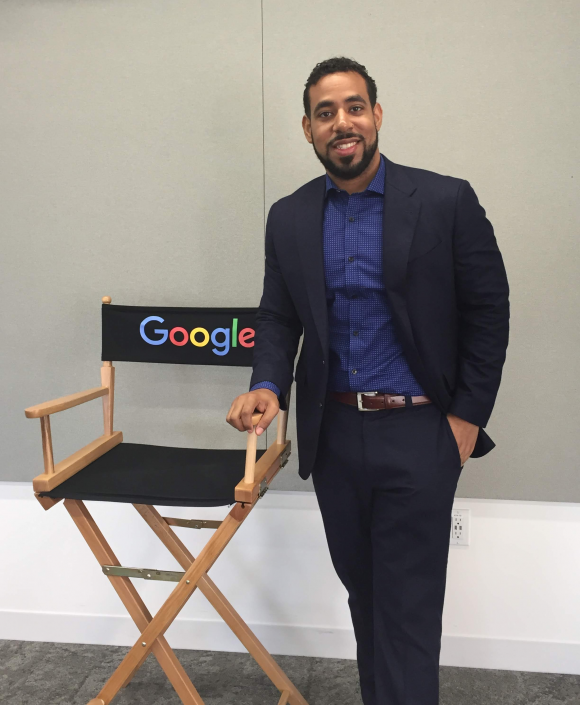
Lewis worked at Google as well as Haynes and Boone LLP through the Google Legal Summer Institute.
Google's Legal Summer Institute (LSI) program is one of the most dynamic opportunities for law students to immerse themselves in a cooperative environment. From the day you arrive on the Google campus, you will notice that the environment is one where cooperation and support are fundamental to the success of the company. The multiple free gourmet cafeterias, the gym, haircuts, free food trucks, tennis courts, basketball courts, soccer fields, volleyball courts, bikes, and free shuttles with wifi make for very happy and productive employees. Google essentially eliminates all extraneous needs for their employees so that can focus on their work without any hindrances.
Every attorney at Google is seasoned and tested. Google’s legal team itself feels like a law firm. Attorneys are broken down into groups to support different product areas. As one can imagine, the work at Google is difficult and attorneys work just as hard in-house as they do at law firms. The expectation of a Google attorney is that they perform. There are multiple opportunities to grow within the company and even change your area of focus, something evidenced by the multiple stories from attorneys who never plan to leave the company.
This year, the LSI program has 17 student participants from law schools around the country. Of those 17, 14 identify as women. Every student came from a diverse background and had varying interests in the legal field. My legal interest has been focussed on artificial intelligence and data privacy. It is no wonder that I found myself immediately surrounded by mentors from the various intellectual property teams. Many were former litigators or patent strategy attorneys from some of the best firms around the world. The other 16 students had similar mentorship opportunities.
The first week of the program focuses on getting acclimated to the Google environment. We met attorneys from varying disciplines, had legal training to make sure that we understand the expectations of a Google lawyer and how to handle varying situations, were introduced to the hiring process at Google, and met with some of the most powerful individuals at the company. For me, it was incredibly important to see minorities, women, and LGBTQ+ attorneys in leadership positions.
Google made sure that we were introduced to every possible opportunity to grow and network. One of the highlights of my summer was actually attending a fireside chat on the current state of Google’s legal team and the company in general with David Drummond, Senior Vice President of corporate development and Chief Legal Officer for Alphabet Inc. The other highlight was having open and honest conversations about the roles and challenges facing women and minorities with Phyllis Turner-Brim (Vice President, Assistant General Counsel IP, Technology & Brand Protection Company NameStarbucks), Karen Robinson (Sr. Director of Intellectual Property, Litigation and Marketing Groups at Adobe), Hilary Ware (Vice President & Associate General Counsel at Netflix), and Harvey Anderson (Deputy General Counsel, HP Inc.).
Lewis with senior leadership in tech.
As part of the Google LSI program, I was matched with a law firm that directly works with Google on various matters. I was lucky enough to be matched with Haynes and Boone LLP, an international corporate law firm with offices in Texas, New York, California, Charlotte, Colorado, Illinois, Washington, D.C., Shanghai, London, and Mexico City.
At Haynes and Boone, I immediately felt accepted and supported. The Palo Alto, California office of the firm is small, but is one of the most important and strategic offices as it allows the firm’s attorneys to stay close to all of its California clients. The size of the firm made for a very targeted summer experience filled with mentorship from every partner and associate, substantive assignments, client meetings, opportunities to work on client presentations, and direct interactions with partners. I was also consistently given opportunities to complete assignments for attorneys in other offices. While I cannot go into detail on the substance of my assignments, I can say without question that everything I worked on was on the forefront of cutting edge technology.
One unique aspect of the firm is its commitment to pro-bono work and the Bay area community. In addition to my other assignments, I was regularly presented with, and chose to help on, various housing pro-bono matters, which gave added to my litigation experience. At the same time, it helped me develop my skills and demonstrated the importance of using my legal knowledge to help those without the financial means to obtain representation. I am eternally grateful to Haynes and Boone for selecting me as a summer associate and gifting me with such a robust and fulfilling summer experience.
Overall, the Google LSI program has been one of the most challenging and exciting opportunities that I’ve ever had in my life. I walk away from the program feeling extremely humbled that I was selected and presented with such a unique opportunity. I am even more confident than ever in the type of law I want to practice and my future career goals.